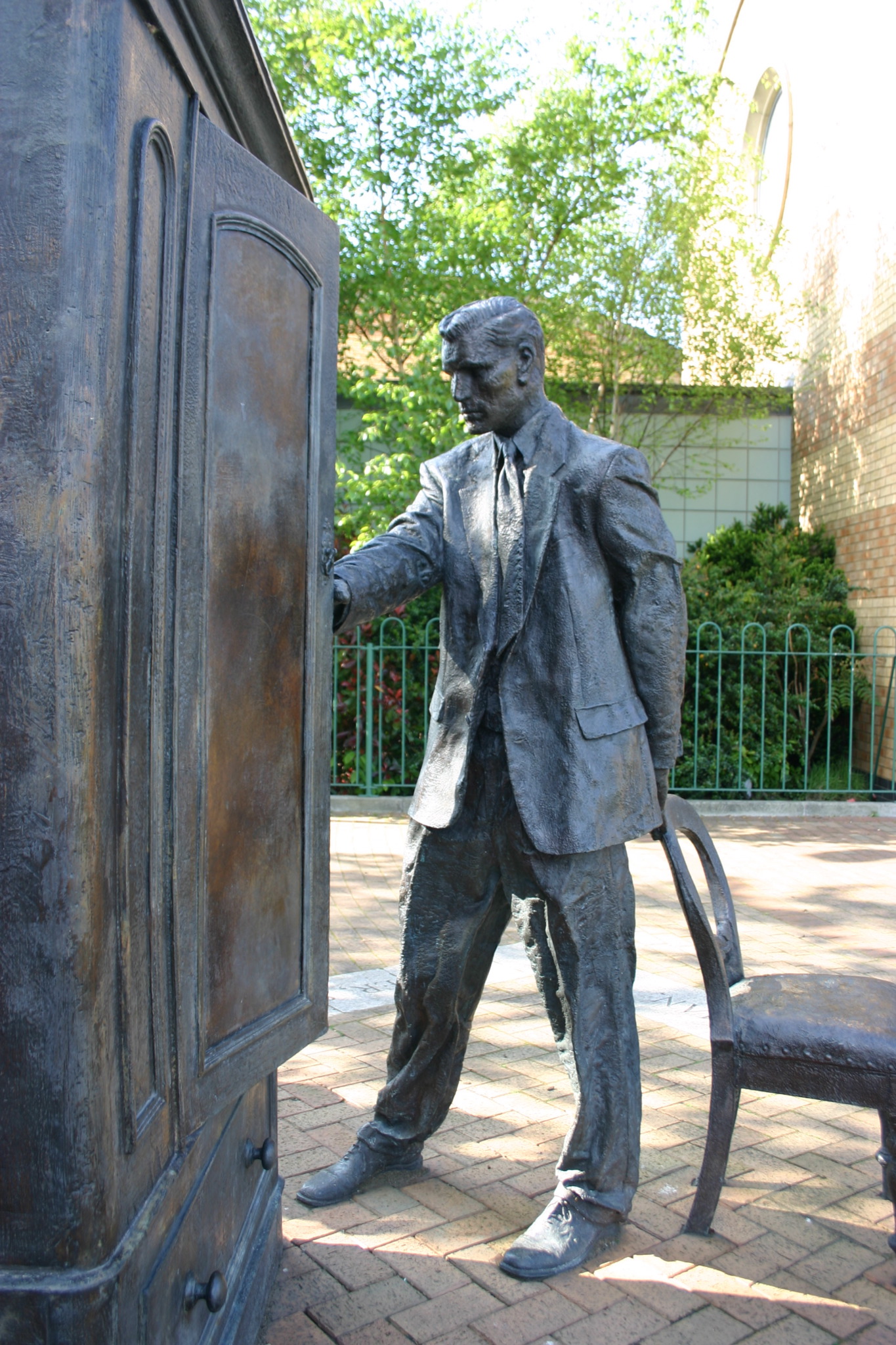The Efficacy of Prayer (1958)
Context: Prayer is not a machine. It is not magic. It is not advice offered to God. Our act, when we pray, must not, any more than all our other acts, be separated from the continuous act of God Himself, in which alone all finite causes operate. It would be even worse to think of those who get what they pray for as a sort of court favorites, people who have influence with the throne. The refused prayer of Christ in Gethsemane is answer enough to that. And I dare not leave out the hard saying which I once heard from an experienced Christian: “I have seen many striking answers to prayer and more than one that I thought miraculous. But they usually come at the beginning: before conversion, or soon after it. As the Christian life proceeds, they tend to be rarer. The refusals, too, are not only more frequent; they become more unmistakable, more emphatic.” Does God then forsake just those who serve Him best? Well, He who served Him best of all said, near His tortured death, “Why hast thou forsaken me?” When God becomes man, that Man, of all others, is least comforted by God, at His greatest need. There is a mystery here which, even if I had the power, I might not have the courage to explore. Meanwhile, little people like you and me, if our prayers are sometimes granted, beyond all hope and probability, had better not draw hasty conclusions to our own advantage. If we were stronger, we might be less tenderly treated. If we were braver, we might be sent, with far less help, to defend far more desperate posts in the great battle.
Works

Mere Christianity
Clive Staples Lewis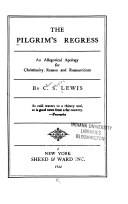
The Pilgrim's Regress
Clive Staples LewisA Grief Observed
Clive Staples Lewis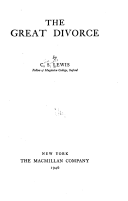
The Great Divorce
Clive Staples Lewis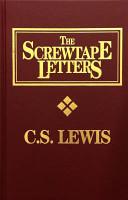
The Screwtape Letters
Clive Staples Lewis
Surprised by Joy
Clive Staples Lewis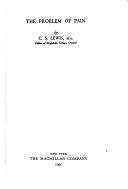
The Problem of Pain
Clive Staples LewisGod in the Dock
Clive Staples Lewis
The Four Loves
Clive Staples Lewis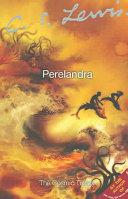
Perelandra
Clive Staples LewisThe Chronicles of Narnia
Clive Staples LewisThe Abolition of Man
Clive Staples Lewis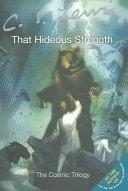
That Hideous Strength
Clive Staples Lewis
Out of the Silent Planet
Clive Staples LewisLetters to Malcolm: Chiefly on Prayer
Clive Staples Lewis
Miracles
Clive Staples Lewis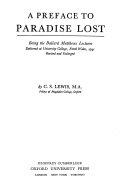
A Preface to Paradise Lost
Clive Staples LewisThe Discarded Image
Clive Staples LewisReflections on the Psalms
Clive Staples LewisTill We Have Faces
Clive Staples LewisStudies in Words
Clive Staples LewisFamous Clive Staples Lewis Quotes
“You can't get a cup of tea large enough or a book long enough to suit me.”
As quoted in Of This and Other Worlds (1982) by Walter Hooper, Preface, p. 9
Equality (1943)
Context: We Britons should rejoice that we have contrived to reach much legal democracy (we still need more of the economic) without losing our ceremonial Monarchy. For there, right in the midst of our lives, is that which satisfies the craving for inequality, and acts as a permanent reminder that medicine is not food. Hence a man's reaction to Monarchy is a kind of test. Monarchy can easily be "debunked", but watch the faces, mark well the accents of the debunkers. These are the men whose taproot in Eden has been cut — whom no rumor of the polyphony, the dance, can reach – men to whom pebbles laid in a row are more beautiful than an arch. Yet even if they desire mere equality they cannot reach it. Where men are forbidden to honor a king they honor millionaires, athletes, or film-stars instead — even famous prostitutes or gangsters. For spiritual nature, like bodily nature, will be served — deny it food and it will gobble poison.
Perelandra (1943)
“Prayer is not a machine. It is not magic. It is not advice offered to God.”
The Efficacy of Prayer (1958)
Context: Prayer is not a machine. It is not magic. It is not advice offered to God. Our act, when we pray, must not, any more than all our other acts, be separated from the continuous act of God Himself, in which alone all finite causes operate. It would be even worse to think of those who get what they pray for as a sort of court favorites, people who have influence with the throne. The refused prayer of Christ in Gethsemane is answer enough to that. And I dare not leave out the hard saying which I once heard from an experienced Christian: “I have seen many striking answers to prayer and more than one that I thought miraculous. But they usually come at the beginning: before conversion, or soon after it. As the Christian life proceeds, they tend to be rarer. The refusals, too, are not only more frequent; they become more unmistakable, more emphatic.” Does God then forsake just those who serve Him best? Well, He who served Him best of all said, near His tortured death, “Why hast thou forsaken me?” When God becomes man, that Man, of all others, is least comforted by God, at His greatest need. There is a mystery here which, even if I had the power, I might not have the courage to explore. Meanwhile, little people like you and me, if our prayers are sometimes granted, beyond all hope and probability, had better not draw hasty conclusions to our own advantage. If we were stronger, we might be less tenderly treated. If we were braver, we might be sent, with far less help, to defend far more desperate posts in the great battle.
Clive Staples Lewis Quotes about God
Letters to Malcolm: Chiefly on Prayer (1963)
Book II, Chapter 3, "The Shocking Alternative"
Mere Christianity (1952)
Source: The Great Divorce (1944–1945), Ch. 9
Book II, Chapter 3, "The Shocking Alternative"
Mere Christianity (1952)
“Pride leads to every other vice: it is the complete anti-God state of mind.”
Book III, Chapter 8, "The Great Sin"
Mere Christianity (1952)
Clive Staples Lewis: Trending quotes
Book I, Chapter 2, "Some Objections"
Mere Christianity (1952)
Context: The most dangerous thing you can do is to take any one impulse of your own nature and set it up as the thing you ought to follow at all costs. There is not one of them which will not make us into devils if we set it up as an absolute guide. You might think love of humanity in general was safe, but it is not. If you leave out justice you will find yourself breaking agreements and faking evidence in trials "for the sake of humanity", and become in the end a cruel and treacherous man.
“It is certainly the most embarrassing verse in the Bible.”
The World's Last Night (1952)
Context: "Say what you like," we shall be told, "the apocalyptic beliefs of the first Christians have been proved to be false. It is clear from the New Testament that they all expected the Second Coming in their own lifetime. And, worse still, they had a reason, and one which you will find very embarrassing. Their Master had told them so. He shared, and indeed created, their delusion. He said in so many words, 'this generation shall not pass till all these things be done.' And he was wrong. He clearly knew no more about the end of the world than anyone else." It is certainly the most embarrassing verse in the Bible.
Source: The Great Divorce (1944–1945), Ch. 9, p. 72; part of this has also been rendered in a variant form, and quoted as:
Context: 'But what of the poor Ghosts who never get into the omnibus at all?'
'Everyone who wishes it does. Never fear. There are only two kinds of people in the end: those who say to God, "Thy will be done," and those to whom God says, in the end, "Thy will be done." All that are in Hell, choose it. Without that self-choice there could be no Hell. No soul that seriously and constantly desires joy will ever miss it. Those who seek find. To those who knock it is opened.'
Clive Staples Lewis Quotes
Book II, Chapter 3, "The Shocking Alternative"
Mere Christianity (1952)
Context: I am trying here to prevent anyone saying the really foolish thing that people often say about Him: 'I'm ready to accept Jesus as a great moral teacher, but I don't accept His claim to be God.' That is the one thing we must not say. A man who was merely a man and said the sort of things Jesus said would not be a great moral teacher. He would be either a lunatic—on a level with the man who says he is a poached egg—or else he would be the Devil of Hell. You must make your choice. Either this man was, and is, the Son of God: or else a madman or something worse. You can shut Him up for a fool, you can spit at Him and kill Him as a demon; or you can fall at His feet and call Him Lord and God. But let us not come with any patronising nonsense about His being a great human teacher. He has not left that open to us. He did not intend to.
The Efficacy of Prayer (1958)
Context: Prayer is not a machine. It is not magic. It is not advice offered to God. Our act, when we pray, must not, any more than all our other acts, be separated from the continuous act of God Himself, in which alone all finite causes operate. It would be even worse to think of those who get what they pray for as a sort of court favorites, people who have influence with the throne. The refused prayer of Christ in Gethsemane is answer enough to that. And I dare not leave out the hard saying which I once heard from an experienced Christian: “I have seen many striking answers to prayer and more than one that I thought miraculous. But they usually come at the beginning: before conversion, or soon after it. As the Christian life proceeds, they tend to be rarer. The refusals, too, are not only more frequent; they become more unmistakable, more emphatic.” Does God then forsake just those who serve Him best? Well, He who served Him best of all said, near His tortured death, “Why hast thou forsaken me?” When God becomes man, that Man, of all others, is least comforted by God, at His greatest need. There is a mystery here which, even if I had the power, I might not have the courage to explore. Meanwhile, little people like you and me, if our prayers are sometimes granted, beyond all hope and probability, had better not draw hasty conclusions to our own advantage. If we were stronger, we might be less tenderly treated. If we were braver, we might be sent, with far less help, to defend far more desperate posts in the great battle.
The World's Last Night (1952)
Context: Christian Apocalyptic offers us no such hope. It does not even foretell, (which would be more tolerable to our habits of thought) a gradual decay. It foretells a sudden, violent end imposed from without; an extinguisher popped onto the candle, a brick flung at the gramophone, a curtain rung down on the play — "Halt!"
Perelandra (1943)
Context: And now, by a transition which he did not notice, it seemed that what had begun as speech was turned into sight, or into something that can be remembered only as if it were seeing. He thought he saw the Great Dance. It seemed to be woven out of the intertwining undulation of many cords or bands of light, leaping over and under one another and mutually embraced in arabesques and flower-like subtleties. Each figure as he looked at it became the master-figure or focus of the whole spectacle, by means of which his eye disentangled all else and brought it into unity — only to be itself entangled when he looked to what he had taken for mere marginal decorations and found that there also the same hegemony was claimed, and the claim made good, yet the former pattern thereby disposed but finding in its new subordination a significance greater than that which it had abdicated. He could see also (but the word "seeing" is now plainly inadequate) wherever the ribbons or serpents of light intersected minute corpuscles of momentary brightness: and he knew somehow that these particles were the secular generalities of which history tells — people, institutions, climates of opinion, civilizations, arts, sciences and the like — ephemeral coruscations that piped their short song and vanished. The ribbons or cords themselves, in which millions of corpuscles lived and died, were the things of some different kind. At first he could not say what. But he knew in the end that most of them were individual entities. If so, the time in which the Great Dance proceeds is very unlike time as we know it. Some of the thinner more delicate cords were the beings that we call short lived: flowers and insects, a fruit or a storm of rain, and once (he thought) a wave of the sea. Others were such things we think lasting: crystals, rivers, mountains, or even stars. Far above these in girth and luminosity and flashing with colours form beyond our spectrum were the lines of personal beings, yet as different from one another in splendour as all of them from the previous class. But not all the cords were individuals: some of them were universal truths or universal qualities. It did not surprise him then to find that these and the persons were both cords and both stood together as against the mere atoms of generality which lived and died in the clashing of their streams: But afterwards, when he came back to earth, he wondered. And by now the thing must have passed together out of the region of sight as we understand it. For he says that the whole figure of these enamored and inter-inanimate circlings was suddenly revealed as the mere superficies of a far vaster pattern in four dimensions, and that figure as the boundary of yet others in other worlds: till suddenly as the movement grew yet swifter, the interweaving yet more ecstatic, the relevance of all to all yet more intense, as dimension was added to dimension and that part of him which could reason and remember was dropped further and further behind that part of him which saw, even then, at the very zenith of complexity, complexity was eaten up and faded, as a thin white cloud fades into the hard blue burning of sky, and all simplicity beyond all comprehension, ancient and young as spring, illimitable, pellucid, drew him with cords of infinite desire into its own stillness. He went up into such a quietness, a privacy, and a freshness that at the very moment when he stood farthest from our ordinary mode of being he had the sense of stripping off encumbrances and awaking from a trance, and coming to himself. With a gesture of relaxation he looked about him…
Source: The Great Divorce (1944–1945), Ch. 13
Context: "Ye can know nothing of the end of all things, or nothing expressible in those terms. It may be, as the Lord said to the Lady Julian, that all will be well, and all will be well, and all manner of things will be well. But it's ill talking of such questions."
"Because they are too terrible, Sir?"
"No. Because all answers deceive. If ye put the question from within Time and are asking about possibilities, the answer is certain. The choice of ways is before you. Neither is closed. Any man may choose eternal death. Those who choose it will have it. But if ye are trying to leap on into Eternity, if ye are trying to see the final state of all things as it will be (for so ye must speak) when there are no more possibilities left but only the Real, then ye ask what cannot be answered to mortal ears. Time is the very lens through which ye see — small and clear, as men see through the wrong end of a telescope — something that would otherwise be too big for ye to see at all. That thing is Freedom: the gift whereby ye most resemble your Maker and are yourselves parts of eternal reality. But ye can see it only through the lens of Time, in a little clear picture, through the inverted telescope. It is a picture of moments following one another and yourself in each moment making some choice that might have been otherwise. Neither the temporal succession nor the phantom of what ye might have chosen and didn't is itself Freedom. They are a lens. The picture is a symbol: but it's truer than any philosophical theorem (or, perhaps, than any mystic's vision) that claims to go behind it. For every attempt to see the shape of eternity except through the lens of Time destroys your knowledge of Freedom."
The World's Last Night (1952)
Context: The doctrine of the Second Coming teaches us that we do not and cannot know when the world drama will end. The curtain may be rung down at any moment: say, before you have finished reading this paragraph.
Book III, Chapter 12, "Faith"
Mere Christianity (1952)
Context: There are two parodies of the truth which different sets of Christians have, in the past, been accused by other Christians of believing: perhaps they may make the truth clearer. One set were accused of saying, "Good actions are all that matters. The best good action is charity. The best kind of charity is giving money. The best thing to give money to is the Church. So hand us over ₤10,000 and we will see you through." The answer to that nonsense, of course, would be that good actions done for that motive, done with the idea that Heaven can be bought, would not be good actions at all, but only commercial speculations. The other set were accused of saying, "Faith is all that matters. Consequently, if you have faith, it doesn't matter what you do. Sin away, my lad, and have a good time and Christ will see that it makes no difference in the end." The answers to that nonsense is that, if what you call your "faith" in Christ does not involve taking the slightest notice of what he says, then it is not Faith at all—not faith or trust in Him, but only intellectual acceptance of some theory of Him.
“He replies to our babble, 'you cannot and dare not. I could and dared.”
A Grief Observed (1961)
Context: And then one babbles — 'if only I could bear it, or the worst of it, or any of it, instead of her.' But one can't tell how serious that bid is, for nothing is staked on it. If it suddenly became a real possibility, then, for the first time, we should discover how seriously we had meant it. But is it ever allowed?
It was allowed to One, we are told, and I find I can now believe again, that He has done vicariously whatever can be done. He replies to our babble, 'you cannot and dare not. I could and dared.
A Grief Observed (1961)
Context: But then again of course I know perfectly well that He can't be used as a road. If you're approaching Him not as the goal but as a road, not as the end but as a means, you're not really approaching Him at all.
Psyche
Till We Have Faces: A Myth Retold (1956)
Context: The sweetest thing in all my life has been the longing — to reach the Mountain, to find the place where all the beauty came from — my country, the place where I ought to have been born. Do you think it all meant nothing, all the longing? The longing for home? For indeed it now feels not like going, but like going back.
Book III, Chapter 10, "Hope"
Mere Christianity (1952)
Context: If you read history you will find that the Christians who did most for the present world were just those who thought most of the next... It is since Christians have largely ceased to think of the other world that they have become so ineffective in this. Aim at Heaven and you will get earth "thrown in": aim at earth and you will get neither.
Book II, Chapter 4, "The Perfect Penitent"
Mere Christianity (1952)
Context: He [God] lends us a little of His reasoning powers and that is how we think: He puts a little of His love into us and that is how we love one another. When you teach a child writing, you hold its hand while it forms the letters: that is, it forms the letters because you are forming them. We love and reason because God loves and reasons and holds our hand while we do it.
Source: Tolkien's The Lord of the Rings, p. 89
Context: But why,' (some ask), 'why, if you have a serious comment to make on the real life of men, must you do it by talking about a phantasmagoric never-never land of your own?' Because, I take it, one of the main things the author wants to say is that the real life of men is of that mythical and heroic quality. One can see the principle at work in his characterization. Much that in a realistic work would be done by 'character delineation' is here done simply by making the character an elf, a dwarf, or a hobbit. The imagined beings have their insides on the outside; they are visible souls. And Man as a whole, Man pitted against the universe, have we seen him at all till we see that he is like a hero in a fairy tale?
Source: Tolkien's The Lord of the Rings, p. 89
Context: But why,' (some ask), 'why, if you have a serious comment to make on the real life of men, must you do it by talking about a phantasmagoric never-never land of your own?' Because, I take it, one of the main things the author wants to say is that the real life of men is of that mythical and heroic quality. One can see the principle at work in his characterization. Much that in a realistic work would be done by 'character delineation' is here done simply by making the character an elf, a dwarf, or a hobbit. The imagined beings have their insides on the outside; they are visible souls. And Man as a whole, Man pitted against the universe, have we seen him at all till we see that he is like a hero in a fairy tale?
“Now, to-day, this moment, is our chance to choose the right side.”
Book II, Chapter 5, "The Practical Conclusion"
Mere Christianity (1952)
Context: Now, to-day, this moment, is our chance to choose the right side. God is holding back to give us that chance. It will not last for ever. We must take it or leave it.
“Friends are not primarily absorbed in each other.”
Equality (1943)
Context: Friends are not primarily absorbed in each other. It is when we are doing things together that friendship springs up – painting, sailing ships, praying, philosophizing, fighting shoulder to shoulder. Friends look in the same direction. Lovers look at each other — that is, in opposite directions. To transfer bodily all that belongs to one relationship into the other is blundering.
Book II, Chapter 3, "The Shocking Alternative"
Mere Christianity (1952)
Hyoi, p. 73 <!-- 1965 edition -->
Out of the Silent Planet (1938)
Context: A pleasure is full grown only when it is remembered. You are speaking, Hmān, as if the pleasure were one thing and the memory another. It is all one thing. The séroni could say it better than I say it now. Not better than I could say it in a poem. What you call remembering is the last part of the pleasure, as the crah is the last part of a poem. When you and I met, the meeting was over very shortly, it was nothing. Now it is growing something as we remember it. But still we know very little about it. What it will be when I remember it as I lie down to die, what it makes in me all my days till then–that is the real meeting. The other is only the beginning of it.
The Abolition of Man (1943)
Context: And all the time — such is the tragi-comedy of our situation — we continue to clamor for those very qualities we are rendering impossible. You can hardly open a periodical without coming across the statement that what our civilization needs is more “drive”, or dynamism, or self-sacrifice, or “creativity”. In a sort of ghastly simplicity we remove the organ and demand the function. We make men without chests and expect of them virtue and enterprise. We laugh at honour and are shocked to find traitors in our midst. We castrate and bid the geldings be fruitful.
Equality (1943)
Context: Every intrusion of the spirit that says, "I'm as good as you" into our personal and spiritual life is to be resisted just as jealously as every intrusion of bureaucracy or privilege into our politics. Hierarchy within can alone preserve egalitarianism without. Romantic attacks on democracy will come again. We shall never be safe unless we already understand in our hearts all that the anti-democrats can say, and have provided for it better than they. Human nature will not permanently endure flat equality if it is extended from its proper political field into the more real, more concrete fields within. Let us wear equality; but let us undress every night.
Book II, Chapter 4, "The Perfect Penitent"
Mere Christianity (1952)
Context: We are told that Christ was killed for us, that His death has washed out our sins, and that by dying He has disabled death itself. That is the formula. That is Christianity. That is what has to be believed. Any theories we build up as to how Christ's death did all this are, in my view, quite secondary: mere plans or diagrams to be left alone if they do not help us, and, if they do help us, not to be confused with the thing itself.
Equality (1943)
Context: There is no spiritual sustenance in flat equality. It is a dim recognition of this fact which makes much of our political propaganda sound so thin. We are trying to be enraptured by something which is merely the negative condition of the good life. That is why the imagination of people is so easily captured by appeals to the craving for inequality, whether in a romantic form of films about loyal courtiers or in the brutal form of Nazi ideology. The tempter always works on some real weakness in our own system of values — offers food to some need which we have starved.
Hyoi, p. 76
Out of the Silent Planet (1938)
Source: The Great Divorce (1944–1945), Ch. 13
Context: "Ye can know nothing of the end of all things, or nothing expressible in those terms. It may be, as the Lord said to the Lady Julian, that all will be well, and all will be well, and all manner of things will be well. But it's ill talking of such questions."
"Because they are too terrible, Sir?"
"No. Because all answers deceive. If ye put the question from within Time and are asking about possibilities, the answer is certain. The choice of ways is before you. Neither is closed. Any man may choose eternal death. Those who choose it will have it. But if ye are trying to leap on into Eternity, if ye are trying to see the final state of all things as it will be (for so ye must speak) when there are no more possibilities left but only the Real, then ye ask what cannot be answered to mortal ears. Time is the very lens through which ye see — small and clear, as men see through the wrong end of a telescope — something that would otherwise be too big for ye to see at all. That thing is Freedom: the gift whereby ye most resemble your Maker and are yourselves parts of eternal reality. But ye can see it only through the lens of Time, in a little clear picture, through the inverted telescope. It is a picture of moments following one another and yourself in each moment making some choice that might have been otherwise. Neither the temporal succession nor the phantom of what ye might have chosen and didn't is itself Freedom. They are a lens. The picture is a symbol: but it's truer than any philosophical theorem (or, perhaps, than any mystic's vision) that claims to go behind it. For every attempt to see the shape of eternity except through the lens of Time destroys your knowledge of Freedom."
Book II, Chapter 3, "The Shocking Alternative"
Mere Christianity (1952)
Context: Among these Jews there suddenly turns up a man who goes about talking as if He was God. He claims to forgive sins. He says He has always existed. He says He is coming to judge the world at the end of time. Now let us get this clear. Among Pantheists, like the Indians, anyone might say that he was a part of God, or one with God: there would be nothing very odd about it. But this man, since He was a Jew, could not mean that kind of God. God, in their language, meant the Being outside of the world, who had made it and was infinitely different from anything else. And when you have grasped that, you will see that what this man said was, quite simply, the most shocking thing that has ever been uttered by human lips.
Equality (1943)
Context: Every intrusion of the spirit that says, "I'm as good as you" into our personal and spiritual life is to be resisted just as jealously as every intrusion of bureaucracy or privilege into our politics. Hierarchy within can alone preserve egalitarianism without. Romantic attacks on democracy will come again. We shall never be safe unless we already understand in our hearts all that the anti-democrats can say, and have provided for it better than they. Human nature will not permanently endure flat equality if it is extended from its proper political field into the more real, more concrete fields within. Let us wear equality; but let us undress every night.
“I am a democrat because I believe in the Fall of Man.”
Equality (1943)
Context: I am a democrat because I believe in the Fall of Man. I think most people are democrats for the opposite reason.
Book I, Chapter 5, "We Have Cause to Be Uneasy"
Mere Christianity (1952)
Context: We have two bits of evidence about the Somebody. One is the universe He has made. If we used that as our only clue, I think we should have to conclude that He was a great artist (for the universe is a very beautiful place), but also that He is quite merciless and no friend to man (for the universe is a very dangerous and terrifying place.)... The other bit of evidence is that Moral Law which He has put in our minds. And this is a better bit of evidence than the other, because it is inside information. You find out more about God from the Moral Law than from the universe in general just as you find out more about a man by listening to his conversation than by looking at a house he has built.
A Grief Observed (1961)
Context: But perhaps I lack the gift. I see I've described her as being like a sword. That's true as far as it goes. But utterly inadequate by itself, and misleading. I ought to have said 'But also like a garden. Like a nest of gardens, wall within wall, hedge within hedge, more secret, more full of fragrant and fertile life, the further you explore.'
And then, of her, and every created thing I praise, I should say 'in some way, in its unique way, like Him who made it.'
Thus up from the garden to the Gardener, from the sword to the Smith. to the life-giving Life and the Beauty that makes beautiful.
Equality (1943)
Context: We Britons should rejoice that we have contrived to reach much legal democracy (we still need more of the economic) without losing our ceremonial Monarchy. For there, right in the midst of our lives, is that which satisfies the craving for inequality, and acts as a permanent reminder that medicine is not food. Hence a man's reaction to Monarchy is a kind of test. Monarchy can easily be "debunked", but watch the faces, mark well the accents of the debunkers. These are the men whose taproot in Eden has been cut — whom no rumor of the polyphony, the dance, can reach – men to whom pebbles laid in a row are more beautiful than an arch. Yet even if they desire mere equality they cannot reach it. Where men are forbidden to honor a king they honor millionaires, athletes, or film-stars instead — even famous prostitutes or gangsters. For spiritual nature, like bodily nature, will be served — deny it food and it will gobble poison.
A Grief Observed (1961)
Context: You never know how much you really believe anything until its truth or falsehood becomes a matter of life and death to you. It is easy to you believe a rope to be strong and sound as long as you are merely using it to cord a box. But suppose that you had to hang by that rope over a precipice. Wouldn't you then first discover how much you really trusted it? … Only a real risk tests the reality of a belief.
The Four Loves (1960)
Context: To love at all is to be vulnerable. Love anything, and your heart will certainly be wrung and possibly be broken. If you want to make sure of keeping it intact, you must give your heart to no one, not even to an animal. Wrap it carefully round with hobbies and little luxuries; avoid all entanglements; lock it up safe in the casket or coffin of your selfishness. But in that casket — safe, dark, motionless, airless — it will change. It will not be broken; it will become unbreakable, impenetrable, irredeemable. The alternative to tragedy, or at least to the risk of tragedy, is damnation. The only place outside of Heaven where you can be perfectly safe from all the dangers and perturbations of love is Hell.
A Grief Observed (1961)
Context: It is hard to have patience with people who say 'There is no death' or 'Death doesn't matter.' There is death. And whatever is matters. And whatever happens has consequences, and it and they are irrevocable and irreversible. You might as well say that birth doesn't matter.
The Four Loves (1960)
Context: To love at all is to be vulnerable. Love anything, and your heart will certainly be wrung and possibly be broken. If you want to make sure of keeping it intact, you must give your heart to no one, not even to an animal. Wrap it carefully round with hobbies and little luxuries; avoid all entanglements; lock it up safe in the casket or coffin of your selfishness. But in that casket — safe, dark, motionless, airless — it will change. It will not be broken; it will become unbreakable, impenetrable, irredeemable. The alternative to tragedy, or at least to the risk of tragedy, is damnation. The only place outside of Heaven where you can be perfectly safe from all the dangers and perturbations of love is Hell.
“Mankind is so fallen that no man can be trusted with unchecked power over his fellows.”
Equality (1943)
Context: I don't deserve a share in governing a hen-roost, much less a nation. Nor do most people — all the people who believe advertisements, and think in catchwords and spread rumors. The real reason for democracy is just the reverse. Mankind is so fallen that no man can be trusted with unchecked power over his fellows. Aristotle said that some people were only fit to be slaves. I do not contradict him. But I reject slavery because I see no men fit to be masters.
“I think that all things, in their own way, reflect heavenly truth, the imagination not least.”
Surprised by Joy (1955)
Context: I do not think the resemblance between the Christian and the merely imaginative experience is accidental. I think that all things, in their own way, reflect heavenly truth, the imagination not least. "Reflect" is the important word. This lower life of the imagination is not a beginning of, nor a step toward, the higher life of the spirit, merely an image.
Source: The Great Divorce (1944–1945), Ch. 9, p. 72; part of this has also been rendered in a variant form, and quoted as:
Context: 'But what of the poor Ghosts who never get into the omnibus at all?'
'Everyone who wishes it does. Never fear. There are only two kinds of people in the end: those who say to God, "Thy will be done," and those to whom God says, in the end, "Thy will be done." All that are in Hell, choose it. Without that self-choice there could be no Hell. No soul that seriously and constantly desires joy will ever miss it. Those who seek find. To those who knock it is opened.'
“Goodness is either the great safety or the great danger—according to the way you react to it.”
Book I, Chapter 5, "We Have Cause to Be Uneasy"
Mere Christianity (1952)
Context: Some people talk as if meeting the gaze of absolute goodness would be fun. They need to think again. They are still only playing with religion. Goodness is either the great safety or the great danger—according to the way you react to it.
Book II, Chapter 1, "The Rival Conceptions of God"
Mere Christianity (1952)
Context: My argument against God was that the universe seemed so cruel and unjust. But how had I got this idea of just and unjust? A man does not call a line crooked unless he has some idea of a straight line. What was I comparing this universe with when I called it unjust?
A Grief Observed (1961)
Context: Can a mortal ask questions which God finds unanswerable? Quite easily, I should think. All nonsense questions are unanswerable. How many hours are there in a mile? Is yellow square or round? Probably half the questions we ask — half our great theological and metaphysical problems — are like that.
“There are two equal and opposite errors into which our race can fall about the devils.”
Preface
The Screwtape Letters (1942)
Context: There are two equal and opposite errors into which our race can fall about the devils. One is to disbelieve in their existence. The other is to believe, and to feel an excessive and unhealthy interest in them. They themselves are equally pleased by both errors and hail a materialist or a magician with the same delight.
Book III, Chapter 6, "Christian Marriage"
Mere Christianity (1952)
Context: Being in love is a good thing, but it is not the best thing. There are many things below it, but there are also things above it. You cannot make it the basis of a whole life. It is a noble feeling, but it is still a feeling... Knowledge can last, principles can last, habits can last; but feelings come and go... But, of course, ceasing to be "in love" need not mean ceasing to love. Love in this second sense—love as distinct from "being in love"—is not merely a feeling. It is a deep unity, maintained by the will and deliberately strengthened by habit; reinforced by (in Christian marriages) the grace which both partners ask, and receive, from God... "Being in love" first moved them to promise fidelity: this quieter love enables them to keep the promise. It is on this love that the engine of marriage is run: being in love was the explosion that started it.
“A pleasure is full grown only when it is remembered.”
Hyoi, p. 73 <!-- 1965 edition -->
Out of the Silent Planet (1938)
Context: A pleasure is full grown only when it is remembered. You are speaking, Hmān, as if the pleasure were one thing and the memory another. It is all one thing. The séroni could say it better than I say it now. Not better than I could say it in a poem. What you call remembering is the last part of the pleasure, as the crah is the last part of a poem. When you and I met, the meeting was over very shortly, it was nothing. Now it is growing something as we remember it. But still we know very little about it. What it will be when I remember it as I lie down to die, what it makes in me all my days till then–that is the real meeting. The other is only the beginning of it.
Book II, Chapter 3, "The Shocking Alternative"
Mere Christianity (1952)
Context: Among these Jews there suddenly turns up a man who goes about talking as if He was God. He claims to forgive sins. He says He has always existed. He says He is coming to judge the world at the end of time. Now let us get this clear. Among Pantheists, like the Indians, anyone might say that he was a part of God, or one with God: there would be nothing very odd about it. But this man, since He was a Jew, could not mean that kind of God. God, in their language, meant the Being outside of the world, who had made it and was infinitely different from anything else. And when you have grasped that, you will see that what this man said was, quite simply, the most shocking thing that has ever been uttered by human lips.
Equality (1943)
Context: Friends are not primarily absorbed in each other. It is when we are doing things together that friendship springs up – painting, sailing ships, praying, philosophizing, fighting shoulder to shoulder. Friends look in the same direction. Lovers look at each other — that is, in opposite directions. To transfer bodily all that belongs to one relationship into the other is blundering.
“They might break our bodies (a microbe can do that) but they need not dominate our minds.”
On Living in an Atomic Age (1948)
Context: If we are going to be destroyed by an atomic bomb, let that bomb when it comes find us doing sensible and human things — praying, working, teaching, reading, listening to music, bathing the children, playing tennis, chatting to our friends over a pint and a game of darts — not huddled together like frightened sheep and thinking about bombs. They might break our bodies (a microbe can do that) but they need not dominate our minds.
Perelandra (1943)
Context: And now, by a transition which he did not notice, it seemed that what had begun as speech was turned into sight, or into something that can be remembered only as if it were seeing. He thought he saw the Great Dance. It seemed to be woven out of the intertwining undulation of many cords or bands of light, leaping over and under one another and mutually embraced in arabesques and flower-like subtleties. Each figure as he looked at it became the master-figure or focus of the whole spectacle, by means of which his eye disentangled all else and brought it into unity — only to be itself entangled when he looked to what he had taken for mere marginal decorations and found that there also the same hegemony was claimed, and the claim made good, yet the former pattern thereby disposed but finding in its new subordination a significance greater than that which it had abdicated. He could see also (but the word "seeing" is now plainly inadequate) wherever the ribbons or serpents of light intersected minute corpuscles of momentary brightness: and he knew somehow that these particles were the secular generalities of which history tells — people, institutions, climates of opinion, civilizations, arts, sciences and the like — ephemeral coruscations that piped their short song and vanished. The ribbons or cords themselves, in which millions of corpuscles lived and died, were the things of some different kind. At first he could not say what. But he knew in the end that most of them were individual entities. If so, the time in which the Great Dance proceeds is very unlike time as we know it. Some of the thinner more delicate cords were the beings that we call short lived: flowers and insects, a fruit or a storm of rain, and once (he thought) a wave of the sea. Others were such things we think lasting: crystals, rivers, mountains, or even stars. Far above these in girth and luminosity and flashing with colours form beyond our spectrum were the lines of personal beings, yet as different from one another in splendour as all of them from the previous class. But not all the cords were individuals: some of them were universal truths or universal qualities. It did not surprise him then to find that these and the persons were both cords and both stood together as against the mere atoms of generality which lived and died in the clashing of their streams: But afterwards, when he came back to earth, he wondered. And by now the thing must have passed together out of the region of sight as we understand it. For he says that the whole figure of these enamored and inter-inanimate circlings was suddenly revealed as the mere superficies of a far vaster pattern in four dimensions, and that figure as the boundary of yet others in other worlds: till suddenly as the movement grew yet swifter, the interweaving yet more ecstatic, the relevance of all to all yet more intense, as dimension was added to dimension and that part of him which could reason and remember was dropped further and further behind that part of him which saw, even then, at the very zenith of complexity, complexity was eaten up and faded, as a thin white cloud fades into the hard blue burning of sky, and all simplicity beyond all comprehension, ancient and young as spring, illimitable, pellucid, drew him with cords of infinite desire into its own stillness. He went up into such a quietness, a privacy, and a freshness that at the very moment when he stood farthest from our ordinary mode of being he had the sense of stripping off encumbrances and awaking from a trance, and coming to himself. With a gesture of relaxation he looked about him…
The Efficacy of Prayer (1958)
Context: Petitionary prayer is, nonetheless, both allowed and commanded to us: “Give us our daily bread.” And no doubt it raises a theoretical problem. Can we believe that God ever really modifies His action in response to the suggestions of men? For infinite wisdom does not need telling what is best, and infinite goodness needs no urging to do it. But neither does God need any of those things that are done by finite agents, whether living or inanimate. He could, if He chose, repair our bodies miraculously without food; or give us food without the aid of farmers, bakers, and butchers; or knowledge without the aid of learned men; or convert the heathen without missionaries. Instead, He allows soils and weather and animals and the muscles, minds, and wills of men to co-operate in the execution of His will. “God,” said Pascal, “instituted prayer in order to lend to His creatures the dignity of causality.” But not only prayer; whenever we act at all He lends us that dignity. It is not really stranger, nor less strange, that my prayers should affect the course of events than that my other actions should do so. They have not advised or changed God's mind—that is, His over-all purpose. But that purpose will be realized in different ways according to the actions, including the prayers, of His creatures.
“I do not contradict him. But I reject slavery because I see no men fit to be masters.”
Equality (1943)
Context: I don't deserve a share in governing a hen-roost, much less a nation. Nor do most people — all the people who believe advertisements, and think in catchwords and spread rumors. The real reason for democracy is just the reverse. Mankind is so fallen that no man can be trusted with unchecked power over his fellows. Aristotle said that some people were only fit to be slaves. I do not contradict him. But I reject slavery because I see no men fit to be masters.
“There are no ordinary people. You have never talked to a mere mortal.”
The Weight of Glory (1949)
Context: It is a serious thing to live in a society of possible gods and goddesses, to remember that the dullest most uninteresting person you talk to may one day be a creature which, if you saw it now, you would be strongly tempted to worship, or else a horror and a corruption such as you now meet, if at all, only in a nightmare. All day long we are, in some degree helping each other to one or the other of these destinations. It is in the light of these overwhelming possibilities, it is with the awe and the circumspection proper to them, that we should conduct all of our dealings with one another, all friendships, all loves, all play, all politics. There are no ordinary people. You have never talked to a mere mortal. Nations, cultures, arts, civilizations — these are mortal, and their life is to ours as the life of a gnat. But it is immortals whom we joke with, work with, marry, snub, and exploit — immortal horrors or everlasting splendors.
